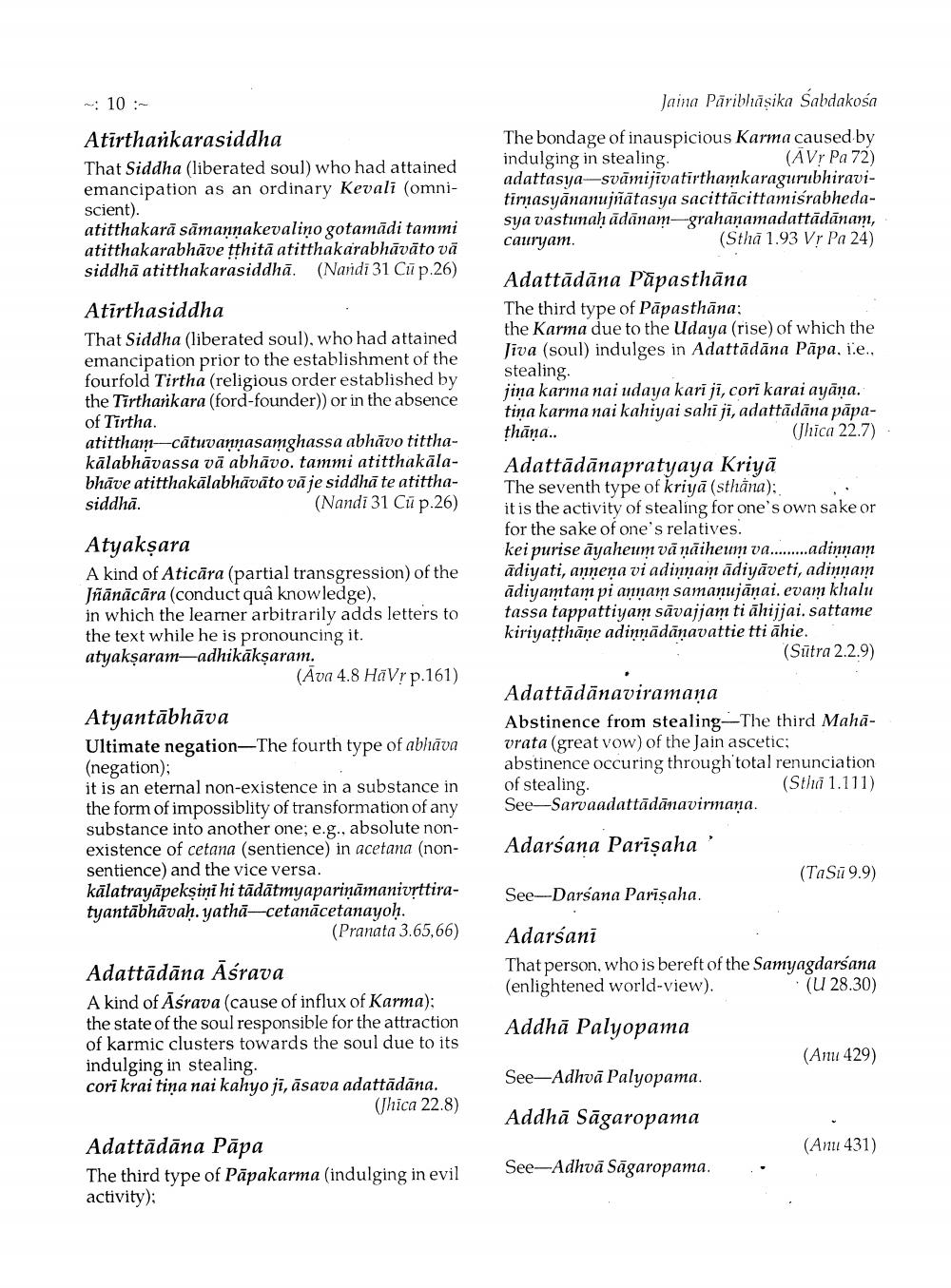________________
10:
Atirtharkarasiddha That Siddha (liberated soul) who had attained emancipation as an ordinary Kevali (omniscient). atitthakarā sāmannakevalino gotamādi tammi atitthakarabhāve tthitā atitthakarabhāvāto vā siddhā atitthakarasiddhā. (Nardi 31 Cū p.26)
Jaina Pāribltāșika Sabdakośa The bondage of inauspicious Karma caused by indulging in stealing.
(AVr Pa 72) adattasya-svāmijivatirthamkaragurubhiravitirnasyānanujñātasya sacittăcittamisrabhedasya vastunaḥādānam-grahanamadattādānam, cauryam.
(Sthā 1.93 Vr Pa 24)
Atirthasiddha That Siddha (liberated soul), who had attained emancipation prior to the establishment of the fourfold Tirtha (religious order established by the Tirtharikara (ford-founder)) or in the absence of Tirtha. atittham-cātuvannasamghassa abhāvo titthakālabhāvassa vā abhāvo. tammi atitthakālabhāve atitthakālabhāvāto vā je siddhā te atitthasiddhā.
(Nandi 31 Cū p.26)
Adattādāna Papasthāna The third type of Pāpasthāna; the Karma due to the Udaya (rise) of which the Jiva (soul) indulges in Adattādāna Pāpa, i.e., stealing jina karma nai udaya kariji, cori karai ayāna. tiņa karma nai kahiyai sahi ji, adattādāna pāpathāņa..
(Thica 22.7) Adattādānapratyaya Kriyā The seventh type of kriyā (sthåna); it is the activity of stealing for one's own sake or for the sake of one's relatives. kei purise āyaheum vā ņāiheum va.........adinnam ādiyati, anneņa vi adinnam ādiyāveti, adinnam ādiyamtam pi annam samanujāņai. evam khalu tassa tappattiyam sāvajjam ti āhijjai. sattame kiriyatthāne adinnādāņavattie tti āhie.
| (Sutra 2.2.9)
Atyaksara A kind of Aticāra (partial transgression of the Jñānācāra (conduct quâ knowledge), in which the learner arbitrarily adds letters to the text while he is pronouncing it. atyakşaram-adhikākşaram.
(Ava 4.8 HãVr p.161)
Adattādānaviramana Abstinence from stealing--The third Mahavrata (great vow) of the Jain ascetic; abstinence occuring through total renunciation of stealing.
(Stha 1.111) See-Sarvaadattādānavirmana.
Atyantābhāva Ultimate negation-The fourth type of abhāva (negation); it is an eternal non-existence in a substance in the form of impossiblity of transformation of any substance into another one; e.g., absolute nonexistence of cetana (sentience) in acetana (nonsentience) and the vice versa. kālatrayāpekşini hi tādātmyapariņāmanivettiratuantābhãoah. Mathā=cetanặcetanayoh.
(Pranata 3.65,66)
Adarśana Parīşaha'
(Tasū9.9)
See-Darsana Parīşaha.
Adarsani That person, who is bereft of the Samyagdarsana (enlightened world-view).
(U 28.30)
Adattādāna Aśrava A kind of Āśrava (cause of influx of Karma); the state of the soul responsible for the attraction of karmic clusters towards the soul due to its indulging in stealing. cori krai tiņa nai kahyoji, āsava adattādāna.
(Thica 22.8)
Addhā Palyopama
(Anu 429)
See-Adhvā Palyopama.
Addhā Sāgaropama
(Anu 431)
Adattādāna Pāpa The third type of Pāpakarma (indulging in evil activity);
See-Adhvā Sāgaropama.




